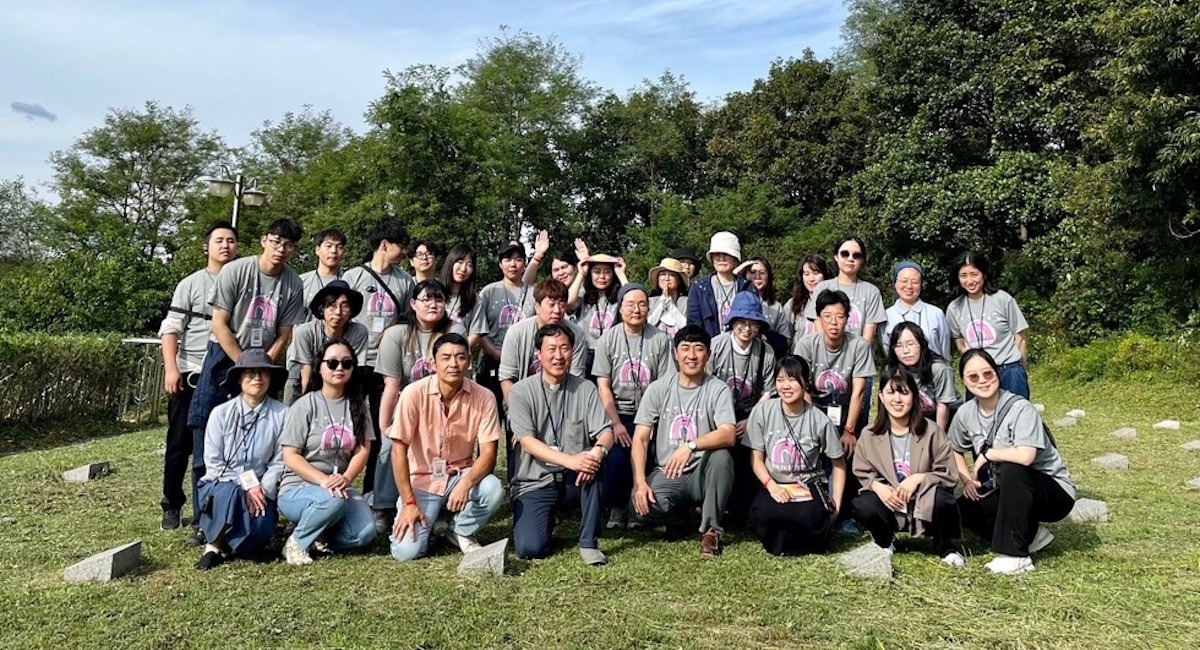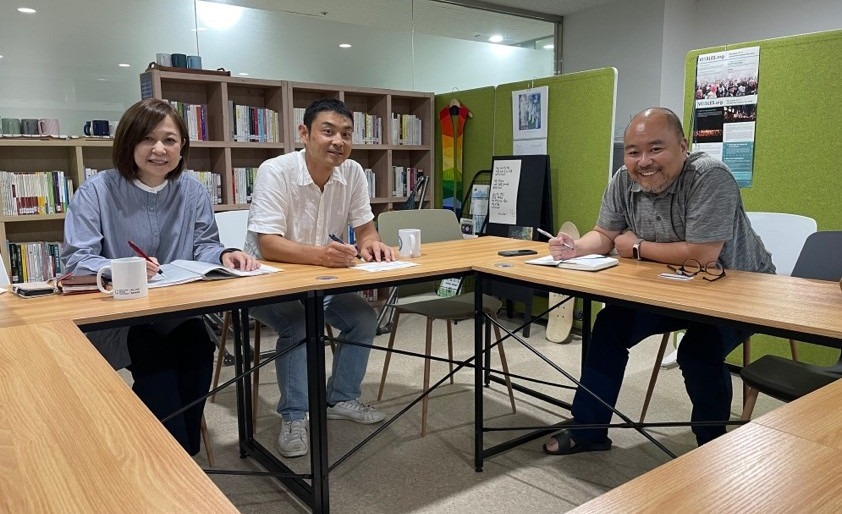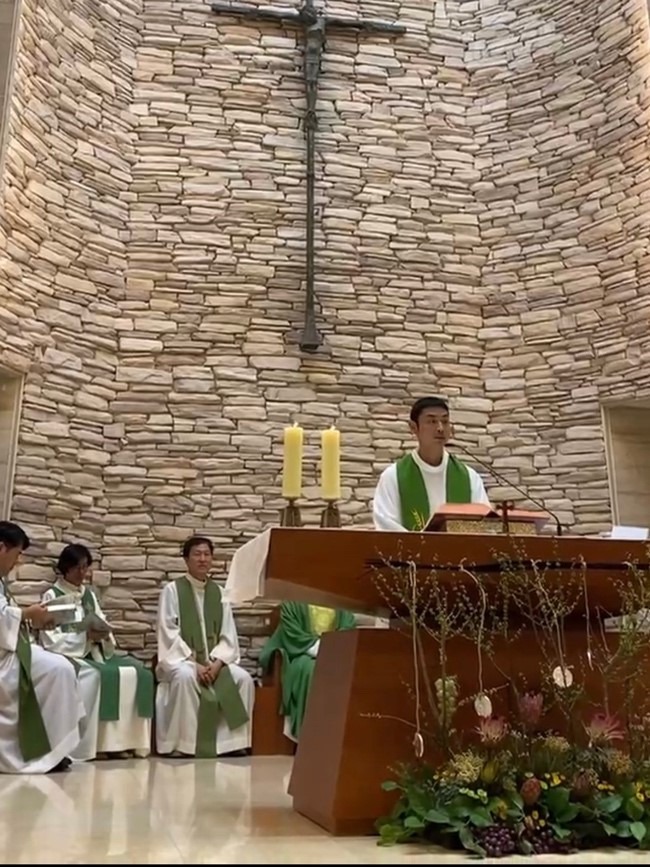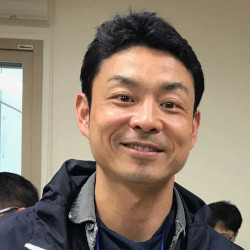
In the latter half of September, I accompanied 11 young people from Japan to a peace camp called “Youth Peace Festival”, where they interacted with Korean youth. Throughout the pandemic, our group in Japan had been communicating online with Fr Peter Kang of Uijeongbu Diocese and his youth group, so it was such a joy when the young people finally met in person.
During the Mass, the Korean youth joined in singing the Japanese song, “Five Loaves and Two Fishes,” which I had been singing since I attended church school. I especially love the third line of the song, which tells the story of a boy offering Jesus what he had and Jesus multiplying it so that 5,000 people were satisfied. “It’s just a small return, but I offer it with gratitude. I received countless blessings. Thank you, Jesus, always and always.” As I reflect on my experiences these past few months, my heart resonates with the heart of that boy in the Gospel.
One of those experiences I recalled was meeting Mrs Kozue Osako of the Tokyo diocese’s Migrant and Refugee Center, CTIC (Catholic Tokyo International Center) during a trip to Tokyo at the end of August. She told me about a high school girl being supported by CTIC who had been separated from her family. Her parents–belonging to the Korean Chinese ethnic minority, a group descended from Korean migrants who had settled near the China-Korea border–had immigrated from China to Japan.
However, due to the challenges posed by Japan’s immigration control system, her father was detained at an immigration centre, which made it difficult for the family to sustain their life in Japan. At the trial, it was decided that her daughter, who was born and raised in Japan, could remain in the country as long as she had someone to take care of her. Faced with an immensely difficult choice, her parents ultimately decided to return to Korea, leaving her behind, as she had grown up in Japan, speaks only Japanese, and has Japanese friends.
After several years, the emotional pain of being separated from her parents became too much to bear, prompting her to seek a visa at the Korean consulate in western Japan with the intention of reuniting with her parents in South Korea. Unfortunately, her visa application was rejected, likely influenced by the right-leaning policies of the South Korean government.
Given this circumstance, her only remaining option is to go to China, where she holds nationality, and attempt to obtain a visa. However, the likelihood of successfully securing a visa to join her parents seemed almost impossible. Mrs Osako had reached out to me to explore whether an effort could be made from the Korean side to help facilitate her reunification with her family.

We resolved to go to Korea, determined to find a way. In preparation for our trip, I started contacting friends there, including Fr Kim Min SJ and Fr Peter Kang of Uijeongbu Diocese, who had experience dealing with such situations. We exchanged valuable information and arranged to meet in person. Although we were aware of the difficulty of our mission, we wanted to do our best regardless of the outcome. Thus, on 8 September, Mrs Osako and I set off for South Korea.
We met with Fr Kim, who kindly and sincerely listened to us as we explained the circumstances of the family. We realised that in order for the daughter to come to Korea and live with her parents, she needed acceptance into a high school. Fr Kim immediately contacted a Catholic school he had a connection with to inquire about the possibility of enrollment. Furthermore, he introduced us to an institution that could provide support for her tuition and living expenses.
Fr Kang, who works for peace and reconciliation in North East Asia, took us and the girl’s parents to the Uijeongbu Diocese Migrants and Refugees Center to meet one of his trusted friends, Fr Pascal, who is very knowledgeable about visa applications. “In this case, the issue of peace and reconciliation in North East Asia, and refugees and migrants are integrated, so I’m glad that we can cooperate,” Fr Kang said. His words gave me much encouragement in my own work for reconciliation and peace in North East Asia and as Coordinator of the Jesuit Conference of Asia Pacific (JCAP) Migrants and Refugees Network. Moreover, Mrs Osako’s remark that “A network is not just about creating a network of contacts. By cultivating relationships of trust, that network can save people” gave me a picture of the kind of network God wants us to create in JCAP. If only countries in our region had been able to forge more peaceful relations, this couple would not have had to suffer so much.
Mrs Osako and I were extremely grateful to Fr Kang and Fr Pascal for being so kind to us Japanese. However, they said, “Thank you for doing so much for our fellow people.” They also had kind words for the Korean Chinese couple, who are often the target of discrimination in both China and South Korea, saying, “We are the same people.”
 Before returning to Japan, I went to the Catholic school, which showed promise in accepting the daughter, to visit a longtime friend who is a religious sister actively involved with the high school.
Before returning to Japan, I went to the Catholic school, which showed promise in accepting the daughter, to visit a longtime friend who is a religious sister actively involved with the high school.
Since our trip, the priests and individuals we met in South Korea have been keeping in touch and collaborating on behalf of the family. Progress is being made in the direction of enabling this family of three to reunite in South Korea. I sincerely hope they can live together in safety and security in their home country.
It was deeply meaningful to find myself back in South Korea two weeks later for the Youth Peace Festival, a gathering aimed at confronting the wounds of history. With young people, we visited the 38th parallel that divides North and South and prayed for the unification of the Korean Peninsula and peace in East Asia. I was really happy that Fr Kang and Fr Pascal were among those who joined the gathering.
On our last day, when we came together with parishioners at a local parish to celebrate a youth Mass, I explained the meaning of the song “Five Loaves and Two Fishes”. Reflecting on God’s graces, I recalled the words of the song: “I have received so many blessings. This is just a small amount I can give back, but I offer it with gratitude.”
I have hope that the young people I work with and my friends within the JCAP network will live out the heart of the young boy who selflessly offered what he had to Jesus. It is a hope to foster relationships of peace that transcend national borders and create a network of trust with colleagues within and across countries. If we do this, we will be able to create a place where refugees and migrants can live peacefully. God sometimes shows signs that He is with us. I dedicate my presence to Him with gratitude.
 Fr Jun Nakai SJ is the Coordinator of the Migrants and Refugees Network of the Jesuit Conference of Asia Pacific.
Fr Jun Nakai SJ is the Coordinator of the Migrants and Refugees Network of the Jesuit Conference of Asia Pacific.

